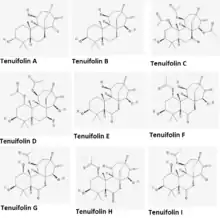
Tenuifolin A-I
Tenuifolins are bio-active terpenoids. Tenuifolins inhibit beta-amyloid synthesis in vitro. Tenuifolins have nootropic activity in vivo via acetylcholinesterase inhibition and increased norepinephrine and dopamine production.
Further reading
- Yoo, Ki-Yeol; Park, So-Young (2012). "Terpenoids as Potential Anti-Alzheimer's Disease Therapeutics". Molecules. 17 (12): 3524–38. CiteSeerX 10.1.1.375.1082. doi:10.3390/molecules17033524. PMC 6268347. PMID 22430119.
- Lv, J.; Jia, H.; Jiang, Y.; Ruan, Y.; Liu, Z.; Yue, W.; Beyreuther, K.; Tu, P.; Zhang, D. (2009). "Tenuifolin, an extract derived from tenuigenin, inhibits amyloid-β secretionin vitro". Acta Physiologica. 196 (4): 419–25. doi:10.1111/j.1748-1716.2009.01961.x. PMID 19208093. S2CID 24062514.
- Zhang, Hong; Han, Ting; Zhang, Lei; Yu, Cheng-Hao; Wan, De-Guang; Rahman, Khalid; Qin, Lu-Ping; Peng, Cheng (2008). "Effects of tenuifolin extracted from radix polygalae on learning and memory: A behavioral and biochemical study on aged and amnesic mice". Phytomedicine. 15 (8): 587–94. doi:10.1016/j.phymed.2007.12.004. PMID 18289838.
This article is issued from Wikipedia. The text is licensed under Creative Commons - Attribution - Sharealike. Additional terms may apply for the media files.